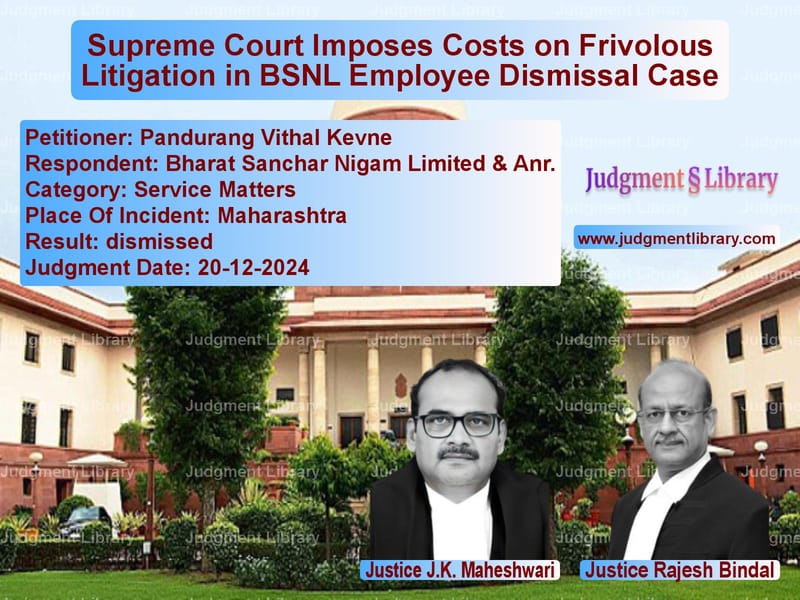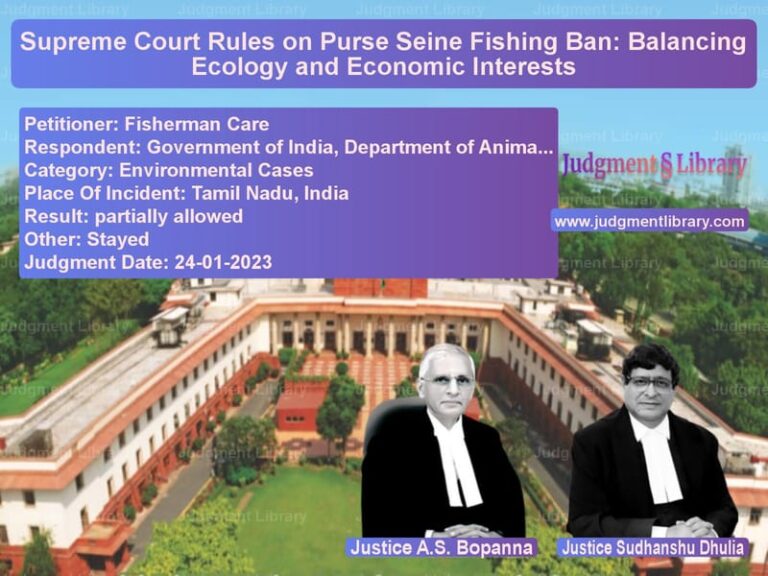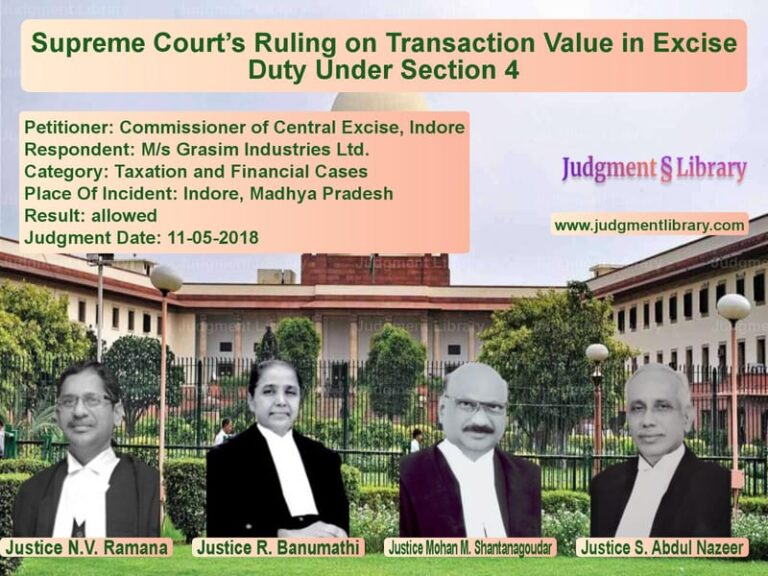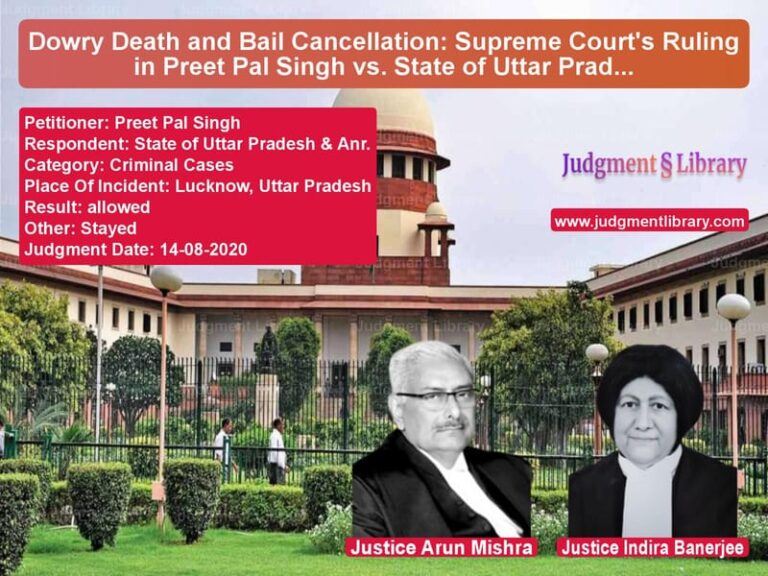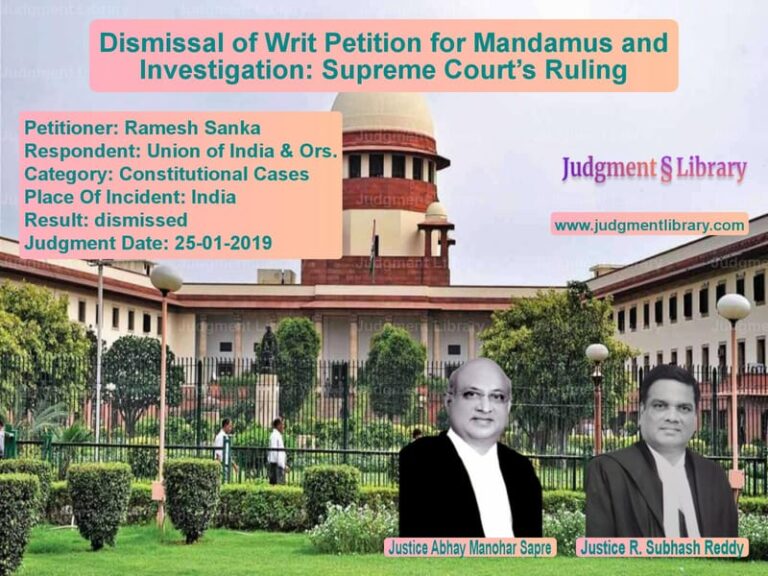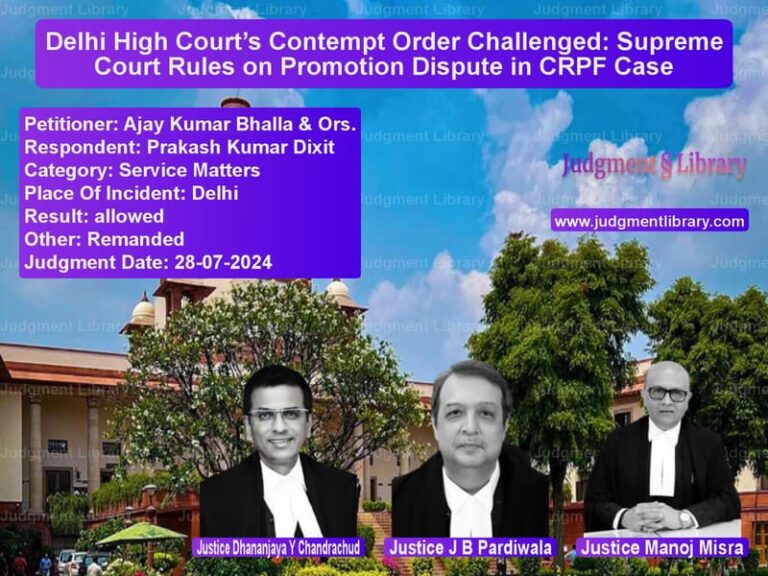Supreme Court Imposes Costs on Frivolous Litigation in BSNL Employee Dismissal Case
The Supreme Court of India recently delivered a scathing judgment in the case of Pandurang Vithal Kevne v. Bharat Sanchar Nigam Limited & Anr., dismissing a Special Leave Petition (SLP) that sought to reopen a long-settled employment dispute. The Court condemned the petitioner’s repeated and frivolous litigation, imposed costs of ₹1,00,000, and warned against the misuse of judicial resources.
Background of the Case
The petitioner, Pandurang Vithal Kevne, was employed as an Examiner with BSNL since 1977. He was dismissed from service on July 14, 2000, after a departmental inquiry found him guilty of frequent unauthorized absences. His statutory appeal was dismissed, and he subsequently raised an industrial dispute, which was referred to the Central Government Industrial Tribunal (CGIT), Mumbai.
On December 22, 2006, the CGIT upheld his dismissal, citing habitual absenteeism and a lack of devotion to duty. Investigations further revealed that while being employed with BSNL, he was running a private business in his wife’s name at his native place. The Tribunal ruled that even if BSNL later regularized some of his absences, it did not negate the fact that he had remained absent without prior permission.
Legal Proceedings
- 2007: The petitioner filed Writ Petition No. 2584 of 2007 before the Bombay High Court, challenging the CGIT’s decision.
- 2009: The High Court upheld the CGIT’s ruling, stating that the petitioner’s repeated unauthorized absences and lack of interest in work justified his dismissal.
- 2010: The petitioner filed Review Petition No. 6 of 2010 before the High Court, which was dismissed.
- 2010: He filed Special Leave Petitions (SLP (C) Nos. 19572-19573 of 2010) before the Supreme Court, both of which were dismissed.
- 2012: He filed complaints against the CGIT Presiding Officer and High Court judges with various authorities, including the Ministry of Law & Justice and the President of India.
- 2015: The dismissed Review Petition No. 6 of 2010 was mistakenly re-listed. However, it was dismissed again.
- 2015: He filed Notices of Motion No. 71 and 369 of 2015 before the High Court, seeking to challenge earlier orders. Both were dismissed.
- 2016: The petitioner filed another SLP (C) No. 4170 of 2016 before the Supreme Court, which was also dismissed.
- 2017-2021: He continued filing complaints against judges and other authorities, alleging corruption.
- 2021: The petitioner misinterpreted an administrative note from the Bombay High Court’s Chief Justice and filed a second Review Petition (No. 7558 of 2021) along with an application for condonation of delay.
- 2024: The High Court dismissed the second Review Petition and refused to condone the delay of 4088 days (over 11 years).
Supreme Court’s Observations
The Supreme Court strongly condemned the petitioner’s conduct, describing his litigation as an abuse of judicial process. The Court observed:
“This Special Leave Petition before us is yet another stark example of the blatant misuse and abuse of the judicial process. The petitioner, seemingly blinded by his own sense of grievance, has embarked on a relentless and frivolous litigation spree, dragging this Court and the High Court through multiple meritless review petitions, appeals, and motions, all stemming from his well-reasoned removal from service.”
It further emphasized that the right to access the courts is a fundamental principle of democracy but must be exercised responsibly:
“When litigants, like the petitioner before us, engage in forum shopping, file repetitive and meritless pleas, and deliberately delay proceedings, they erode the very foundation of our legal system.”
The Court reiterated that multiple judicial bodies, including the CGIT, High Court, and Supreme Court, had upheld the petitioner’s dismissal based on clear evidence of misconduct. The Court highlighted:
- The petitioner’s attempts to misuse the judicial system by repeatedly filing unmeritorious petitions.
- His baseless allegations against judicial officers, including complaints to the President and Prime Minister.
- The improper re-listing of a dismissed Review Petition in 2015, which should not have occurred.
Final Judgment
The Supreme Court dismissed the Special Leave Petition, refusing to condone the delay of over 11 years in filing the second Review Petition. It imposed a cost of ₹1,00,000 on the petitioner, payable to the Maharashtra State Legal Services Authority within four weeks.
The Court stated:
“Considering that precious time of this Court and the High Court was wasted by the petitioner, in our opinion the petitioner deserves to be burdened with heavy cost, to give a clear message to unscrupulous litigants like the petitioner for not daring to play with the Judicial System.”
The Court further warned that frivolous litigation obstructs the administration of justice:
“The precious judicial time which the petitioner has wasted, could very well be used for taking up the cases of other litigants who are waiting for justice. In fact, these types of litigants are choking the system of the court, which is resulting in delays in decision of other cases.”
The Court ordered that if the petitioner fails to deposit the cost, it shall be recovered as arrears of land revenue.
Implications of the Judgment
This judgment serves as a strong deterrent against frivolous litigation. Key takeaways include:
- Discouragement of meritless petitions: The Court has sent a clear message that persistent abuse of legal remedies will not be tolerated.
- Judicial efficiency: The ruling highlights the need to prevent unnecessary litigation that clogs court dockets and delays justice for genuine cases.
- Costs as a deterrent: The imposition of financial penalties on frivolous litigants reinforces accountability and discourages repeated misuse of legal forums.
Conclusion
The Supreme Court’s decision in Pandurang Vithal Kevne v. BSNL is a landmark judgment reinforcing judicial discipline. By penalizing frivolous litigation and emphasizing responsible use of the legal system, the Court has taken a firm stand against practices that hinder justice. This ruling will serve as a precedent for courts dealing with habitual litigants attempting to manipulate the system through repeated, baseless appeals.
Petitioner Name: Pandurang Vithal Kevne.Respondent Name: Bharat Sanchar Nigam Limited & Anr..Judgment By: Justice J.K. Maheshwari, Justice Rajesh Bindal.Place Of Incident: Maharashtra.Judgment Date: 20-12-2024.
Don’t miss out on the full details! Download the complete judgment in PDF format below and gain valuable insights instantly!
Download Judgment: pandurang-vithal-kev-vs-bharat-sanchar-nigam-supreme-court-of-india-judgment-dated-20-12-2024.pdf
Directly Download Judgment: Directly download this Judgment
See all petitions in Termination Cases
See all petitions in Disciplinary Proceedings
See all petitions in Public Sector Employees
See all petitions in Judgment by J.K. Maheshwari
See all petitions in Judgment by Rajesh Bindal
See all petitions in dismissed
See all petitions in supreme court of India judgments December 2024
See all petitions in 2024 judgments
See all posts in Service Matters Category
See all allowed petitions in Service Matters Category
See all Dismissed petitions in Service Matters Category
See all partially allowed petitions in Service Matters Category

